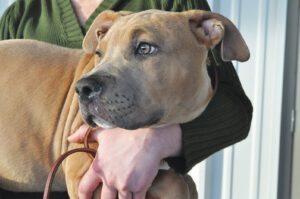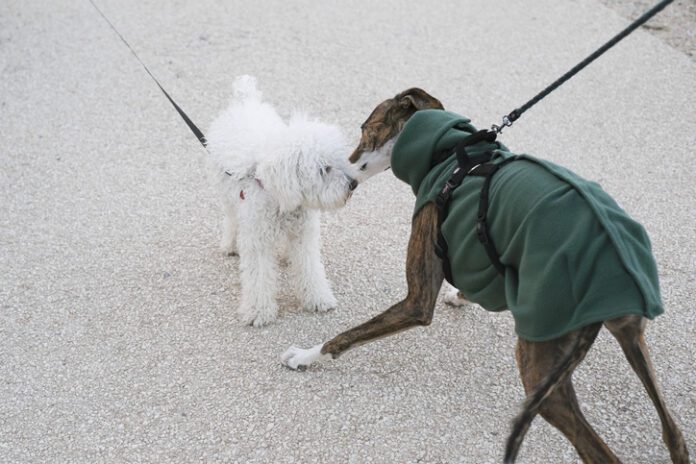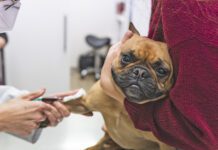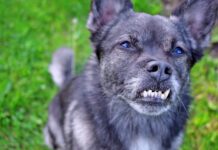Canine kennel cough is an infection of the upper respiratory tract, specifically the nose, eyes, throat, and trachea. It is also known as infectious tracheobronchitis (ITB) or Canine Infectious Respiratory Disease Complex (CIRDC) – and it’s as ubiquitous in dogs as the common cold in humans. In fact, kennel cough is spread among dogs much the same way that upper respiratory illnesses are transmitted among people. Fortunately, there are more vaccinations that can prevent kennel cough (or reduce the severity of the illness) in dogs than there are vaccines that can prevent colds in humans!
Causes of kennel cough
There are several bacteria and viruses that are responsible for kennel cough. A dog may be infected with only one of these organisms but often have a co-infection of two or more pathogens.
Bordetella bronchiseptica is a bacteria that can cause kennel cough. It can either be the sole agent of a dog’s illness or it can cause infection secondary to a virus.
Mycoplasma is a bacteria that exists naturally in the respiratory tract of most dogs. But in the presence of another primary agent of kennel cough (like B. bronchiseptica or a virus), it may contribute to a dog’s clinical signs.
There are also several viruses that can cause kennel cough. These include canine adenovirus-2 (CAV-2), canine parainfluenza virus (CPiV), canine herpesvirus (CHV), and canine distemper virus (CDV). Canine coronavirus can also cause kennel cough but has no relation to the coronavirus that causes COVID-19 in people. The canine influenza viruses H3N2 and H3N8 have also been implicated in cases of kennel cough but are not the same as the influenza viruses that cause seasonal flu in people.

Once a dog is ill with one of the primary agents of kennel cough, they can develop a secondary infection with one of the other primary agents or with an opportunistic bacteria. These opportunistic bacteria include Pseduomonas, Pasteurella, or the coliform class of bacteria.
Kennel cough is spread by close contact with infected dogs and their respiratory secretions. Respiratory secretions include aerosolized droplets from sneezing or coughing and saliva or nose and eye discharge that is left on bowls, blankets, floors, walls, and people’s clothes. It can be easily spread between dogs that attend doggie daycare, go to dog parks, or go to the groomer or attend training classes.
Just like with humans and the common cold, there is a period of time where dogs may be shedding one of the organisms responsible for kennel cough but are not yet showing signs of illness. This is called the incubation period. The incubation period varies by organism and can be as short as two days and as long as 14 days.
Vaccinating against kennel cough is important
One of the best ways to minimize the risk of contracting kennel cough is to ensure that your dog is properly vaccinated. Vaccines are available for B. bronchiseptica, CAV-2, CPiV, CDV, and both canine influenza strains.
The vaccine for B. bronchiseptica is available in three forms: an injectable form as well as intranasal and oral forms. The intranasal form is available for just B. bronchiseptica or is combined with the vaccine for CPiV. This vaccine is given once initially and then is boostered annually.
The vaccines for CDV and CAV-2 are combined with the vaccine for canine parvovirus. This vaccine is commonly known as the DAP vaccine (for distemper, adenovirus, and parvovirus). There is a version of this vaccine that includes CPiV. This combination vaccine is given every two to four weeks to puppies as young as six weeks old until they are sixteen weeks of age. It is boostered one year after the last puppy dose and then every three years after that.
The canine influenza vaccine provides some protection against both strains that have been identified in the United States. This vaccine is given initially as a two-dose series two to four weeks apart and then boostered annually.
It is important to remember that no vaccine is 100% effective. It is still possible to develop kennel cough even when fully vaccinated. If your dog’s infection is being caused by an organism for which they are vaccinated, then their illness will likely be milder and their recovery time should be shorter.
Other kennel cough prevention strategies
Unfortunately, neither we nor our dogs can live in a bubble to protect us from contracting respiratory illnesses. But there are some basic steps we can take to prevent the spread of kennel cough.
Talk to your doggie daycare provider about their infectious disease prevention protocols. Most reputable daycare providers have a documented cleaning strategy that is executed multiple times a day with periodic deep cleanings that are completed at least once a week. These providers also require proof of vaccination for each attendee. They should inquire with each dog parent about any recent coughing or sneezing before admitting a dog to the facility for the day.
You can also be proactive when setting up doggie play dates for your pooch. Ask each dog’s owner about their dog’s vaccination status and if their dog or any other dog in the family is or has been recently ill. Organisms that cause kennel cough can be shed in a dog’s respiratory secretions for up to 14 days after their clinical signs resolve. If there is any doubt about another dog’s health status, you have the power to protect your dog and reschedule the play date!
When it comes to dog parks – well, there is no way to know whether all of the dogs who have been brought to the park have been vaccinated or kept from the park when potentially shedding a virus or bacterial cause of kennel cough.
If your dog frequents the groomer, pick a facility that has a documented cleaning protocol for tables, cages, and grooming tools. You can also minimize your dog’s exposure to potential pathogens by picking up your dog from the grooming facility as soon as their spa treatment is complete.
During the warmer months, dog-friendly shopkeepers set bowls of water outside their shops to help keep our dogs hydrated on warm days. While this is a super nice gesture, these bowls provide a potential way to spread organisms that cause kennel cough in our dogs. Bring your own dog bowl and water and offer water to your pooch often while you are out on the town.
We cannot completely prevent all the potential causes of kennel cough – but we can minimize their risk of exposure to pathogens and the severity of their illness should they become ill. By being a proactive dog parent, you have the power to keep your dog safe and healthy!







I vaccinated my Maltese for kennel cough and she immediately developed the disease. Vet said it wasn’t possible but it took two rounds of antibiotics for her to recover. Will not do that again with any dog
I hope you will feature an article from researcher Dr. Jean Dodd about the efficacy of bordetella vaccines vs the treatablity of bordetella illness in otherwise healthy dogs. She also can provide important information about oral bordetella vaccine vs injections that include adjuvant ingredients that can cause side effects. I choose not to vaccinate my dog for bordetella.
Yes! The article could be quite confusing if the reader didn’t already have background information regarding vaccines. I respect & follow Dr. Dodd’s vaccine protocol,; I don’t vaccinate for Bordetella & with the latest research on the viability of vaccines, I choose to titer first. My previous dog’s titer for rabies showed viability over 7 years.
As a long time, multi dog owner, who follows a “minimual” vaccine protecol, I do not vaccinate for kennel cough. Here in the US, we way over medicate and vaccinate our compaions. Every single dog I have owned, including my current youngest, has had one single eposoide of kennel cough. From my experience (8 dogs total) all of my dogs have contacted kennel cough, recovered with minamal issues, and NEVER get kennel cough again in their live times? All of my past dogs, each lived to over 13 year old or more. One over 16 years old, but once they had kennel cough they never had a repeat insidence. I know things can chance and although I have never had to place my dogs in a commercial “kennel environment” it appears that once a healthy dog has had kennel cough, it can provide lifetime immunities. Just to be clear, my dogs are often in indoor enviroments where others dogs are at weekly agility classes and trials, which is where I suspect all of my dogs have been exposed to kennel cough. It is an interesting idea (explained by a Vet) that he believes dogs are shedding the virus before they present actual symphtoms, which is one of the reasons kennel cough can spread so quickly. By the time a dog is actually coughing, and kept home/separated they are no longer contagious. It is prior to exhibiting symptoms, that they are contagious. No one with any dog experience would knowling spread the diease, but since they don’t know their dog has it until they present symptoms, the virus has already been exposed to others.
Shortly after the canine influenza injection became available, I had it given to the dog I was showing. First shot, no problem. Second shot, severe reaction before I even got home. He was gagging like there was something stuck in his throat; it was swelling shut. Raced him back to vet & they Xrayed him cause they didn’t believe it was the vaccine. Luckily the drug co paid for everything since I insisted my vet contact them about the bad reaction. You just never know. Glad I was aware of a problem before I lost him.
We have been a multiple dogs household since 1992 and never vaccinated for kennel cough. We did not have a case of KC till 2015, brought home by one dog from a dog show. She generously shared it with everyone at home. Some coughed, others had hardly any symptoms but it came and went without serious incidents. Several years later we brought home another case. Interestingly, NONE of the dogs who were infected before and recovered got it again. Only two, who were not yet born at the time of the first round, got a mild case and nothing now for several years. I do believe those who were infected and recovered gained very strong immunity. Some have been to shows so there was a good chance bringing it home again but as everyone was affected in the past and recovered I do feel the are well immunized and that is the reason we have not have not had another symptomatic dog. Hopefully they are immunized for life.
I would like to hear from a veterinarian on whether there is natural immunity following a dog wh was infected with kennel cough?